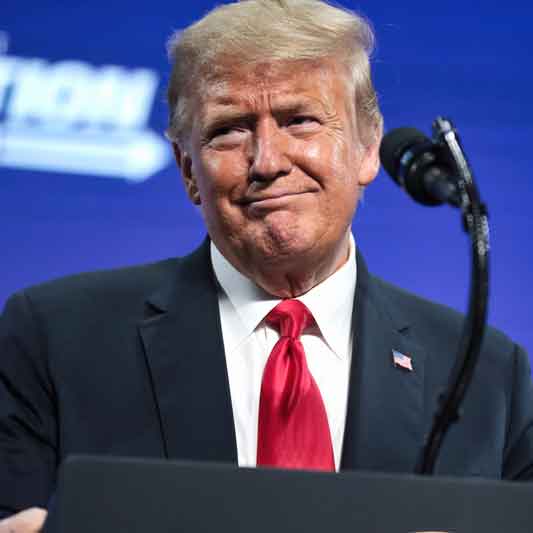On April 9, 2025, President Donald Trump addressed the media in the Oval Office, posing the question, “How do you get to be president and you’re stupid?”
This comment was made as he sought to redirect blame for the economic issues in the United States more towards his predecessors rather than China, which he has subjected to a 145% tariff. Critics quickly seized upon the irony in his statement.
Social media users responded promptly. One user remarked, “We’ve been wondering this since 2016, Donald.” Another stated, “The question on all our minds these days.” These reactions indicate a broader public questioning of the president’s awareness in making such a statement.
The president’s comments came during a time of significant economic instability. On April 2, he announced extensive tariffs on foreign products, which led to a steep decline in the U.S. stock market and drew criticism from both sides of the aisle. The European Union retaliated with a 25% tariff on U.S. goods, while China increased tariffs on American products to 84%. To address rising tensions, Trump announced a 90-day pause on tariffs for most nations, excluding China, whose import taxes were raised to 145%. Despite the market’s volatility, the president expressed confidence in his strategies.
The business community had varied reactions to the tariff pause. Billionaire investor Bill Ackman considered it a strategic negotiation tactic directed at China. On the other hand, economist Diane Swonk warned that the effective tariff rate had risen due to specific duties on Chinese imports, reaching 30.5%. Hedge fund founder Spencer Hakimian criticized the administration’s inconsistent trade policy, emphasizing the uncertainty it introduced to the market.
Late-night television hosts also commented on the developments. Jimmy Kimmel compared the president’s economic actions to those of a reckless gambler, saying Trump “drove the economy into a sand trap and took a mulligan.”
Seth Meyers highlighted the administration’s inconsistency, noting that officials had denied any tariff pause was under consideration just one day before.
Stephen Colbert mocked the unpredictability of Trump’s policies, suggesting that the president had averted a self-inflicted crisis by reversing his own decision. These critiques reflect broader concerns regarding the administration’s economic policy management.
In the financial sector, the president’s tariff announcements led to significant market fluctuations. The Dow Jones Industrial Average experienced historic volatility, with a record-breaking rally followed by a sharp decline. On April 9, the Dow surged nearly 8% following the tariff pause announcement, only to fall over 2,000 points the next day. Analysts attributed this instability to ongoing uncertainty surrounding U.S. trade policies and their potential impact on the global economy. Economists warned that such volatility could have long-term repercussions for investor confidence and economic growth.
Internationally, the tariff pause prompted varied responses. The European Union viewed the suspension as a negotiation opportunity, temporarily halting its retaliatory measures while preparing contingency plans. China, however, remained excluded from the reprieve, with increased tariffs further straining U.S.-China trade relations.
Global leaders questioned the strategic direction of U.S. trade policy, expressing concerns about the potential for prolonged economic uncertainty.
Domestically, political figures shared their views on the tariff developments. Republican leaders largely supported the president’s actions, emphasizing the need to address trade imbalances. Speaker of the House Mike Johnson expressed confidence that, despite initial difficulties, the policy would ultimately benefit Americans.
In contrast, Democratic leaders criticized the tariffs as a tax on consumers, arguing that they would not effectively rebuild American manufacturing or support working families.
During the third week of April 2025, global financial markets experienced heightened volatility in response to President Trump’s tariff policies.
- Major indices such as the S&P 500, Nasdaq Composite, and Dow Jones Industrial Average faced significant declines earlier in the month due to the announcement of sweeping tariffs. However, recent statements from the Trump administration indicating a potential de-escalation in the trade conflict with China have led to a partial recovery. For instance, the S&P 500 rose by approximately 2.5% following comments from Treasury Secretary Scott Bessent suggesting a possible reduction in tariffs. European and Asian markets mirrored the U.S. trends.
- President Trump announced that the existing 145% tariffs on Chinese goods would be “substantially” reduced, though not entirely eliminated. He emphasized that while the tariffs would decrease, they “won’t be zero,” indicating a strategic approach to ongoing trade negotiations.
The International Monetary Fund (IMF) revised its global growth forecast for 2025 downward to 2.8% from 3.3%, citing the adverse effects of the tariffs and the resulting uncertainty. The U.S. growth projection was also lowered from 2.7% to 1.8%.
While initial tariff announcements led to market downturns and economic concerns, recent indications of potential tariff reductions have provided some relief to global markets. Nonetheless, the situation remains fluid, and markets continue to respond to policy developments and trade negotiations.

